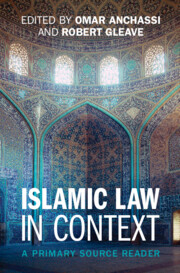Book contents
- Islamic Law in Context
- Islamic Law in Context
- Copyright page
- Contents
- Acknowledgements
- Contributors
- Introduction
- Part I Islamic Legal Theory (Uṣūl al-Fiqh) and Related Genres
- Part II Islamic Jurisprudence (Fiqh) and Related Genres
- Part III Legal Opinions (Fatwās)
- Chapter 17 Introduction to Part III
- Chapter 18 Ottoman Fatwās on the Substitution of Defunct Endowment Properties, from al-Aqwāl al-Marḍiyya of Qāḍīzādah Muḥammad Ṭāhir (d. 1254/1834)
- Chapter 19 Settling Disputes among Nomads
- Chapter 20 Fatwās on Aspects of Modern Life
- Chapter 21 ‘According to the Qaul Muʿtamad it is Unlawful and Invalid’
- Chapter 22 An Online Fatwā from the Dār al-Iftāʾ al-Miṣriyya on Women’s Leadership
- Chapter 23 ‘His Doctrine is Deviant’
- Part IV Court Judgments and Other Court Documentation
- Part V Judicial Manuals and Reference Books
- Part VI Alternative Sources for Islamic Legal Studies
- Name Index
- Subject Index
- References
Chapter 19 - Settling Disputes among Nomads
Four Fatwās from Early Nineteenth-Century Mauritania
from Part III - Legal Opinions (Fatwās)
Published online by Cambridge University Press: 14 November 2024
- Islamic Law in Context
- Islamic Law in Context
- Copyright page
- Contents
- Acknowledgements
- Contributors
- Introduction
- Part I Islamic Legal Theory (Uṣūl al-Fiqh) and Related Genres
- Part II Islamic Jurisprudence (Fiqh) and Related Genres
- Part III Legal Opinions (Fatwās)
- Chapter 17 Introduction to Part III
- Chapter 18 Ottoman Fatwās on the Substitution of Defunct Endowment Properties, from al-Aqwāl al-Marḍiyya of Qāḍīzādah Muḥammad Ṭāhir (d. 1254/1834)
- Chapter 19 Settling Disputes among Nomads
- Chapter 20 Fatwās on Aspects of Modern Life
- Chapter 21 ‘According to the Qaul Muʿtamad it is Unlawful and Invalid’
- Chapter 22 An Online Fatwā from the Dār al-Iftāʾ al-Miṣriyya on Women’s Leadership
- Chapter 23 ‘His Doctrine is Deviant’
- Part IV Court Judgments and Other Court Documentation
- Part V Judicial Manuals and Reference Books
- Part VI Alternative Sources for Islamic Legal Studies
- Name Index
- Subject Index
- References
Summary
This chapter explores four legal opinions (fatwās) of the Mauritanian jurist al-Qaṣrī b. Muḥammad (d. 1235/1819) from the Nawāzil al-Qaṣrī. Islamic law has typically been an urban discourse produced by scholars based in cities, but from the 17th century onwards, the emergence of nomadic groups specialising in religious studies fostered the spread of Islamic literacy and law in the trans-Saharan region. This rural juristic activity, produced away from the cities and among pastoralist and other non-sedentary groups, differed from that of the urban jurists, and is available in the form of ‘case collections’ (nawāzil), responsa (ajwiba) and archival documents that allow us to write the cultural and social history of pre-colonial West Africa from an insider’s perspective.
Keywords
- Type
- Chapter
- Information
- Islamic Law in ContextA Primary Source Reader, pp. 204 - 213Publisher: Cambridge University PressPrint publication year: 2024

